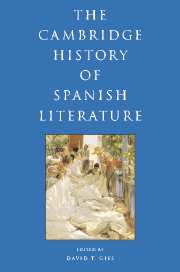Book contents
- Frontmatter
- I INTRODUCTION
- II HISTORY AND CANONICITY
- III THE MEDIEVAL PERIOD
- IV EARLY MODERN SPAIN: RENAISSANCE AND BAROQUE
- V THE ENLIGHTENMENT AND NEOCLASSICISM
- VI THE FORGING OF A NATION: THE NINETEENTH CENTURY
- VII THE MODERN, MODERNISMO, AND THE TURN OF THE CENTURY
- 32 Nineteenth-century women writers
- 33 The Catalan Renaixença
- 34 Great masters of Spanish Modernism
- 35 The poetry of Modernismo in Spain
- 36 Modernism in Catalonia
- 37 Modernist narrative in the 1920s
- 38 Noucentisme
- 39 Ideas, aesthetics, historical studies
- 40 The Catalan Avant-Garde
- VIII TWENTIETH-CENTURY SPAIN AND THE CIVIL WAR
- IX IN AND OUT OF FRANCO SPAIN
- X POST-FRANCO SPANISH LITERATURE AND FILM
- Bibliography
- Index
- References
39 - Ideas, aesthetics, historical studies
from VII - THE MODERN, MODERNISMO, AND THE TURN OF THE CENTURY
Published online by Cambridge University Press: 28 March 2008
- Frontmatter
- I INTRODUCTION
- II HISTORY AND CANONICITY
- III THE MEDIEVAL PERIOD
- IV EARLY MODERN SPAIN: RENAISSANCE AND BAROQUE
- V THE ENLIGHTENMENT AND NEOCLASSICISM
- VI THE FORGING OF A NATION: THE NINETEENTH CENTURY
- VII THE MODERN, MODERNISMO, AND THE TURN OF THE CENTURY
- 32 Nineteenth-century women writers
- 33 The Catalan Renaixença
- 34 Great masters of Spanish Modernism
- 35 The poetry of Modernismo in Spain
- 36 Modernism in Catalonia
- 37 Modernist narrative in the 1920s
- 38 Noucentisme
- 39 Ideas, aesthetics, historical studies
- 40 The Catalan Avant-Garde
- VIII TWENTIETH-CENTURY SPAIN AND THE CIVIL WAR
- IX IN AND OUT OF FRANCO SPAIN
- X POST-FRANCO SPANISH LITERATURE AND FILM
- Bibliography
- Index
- References
Summary
Few twentieth-century Spanish minds match those of Ramón Menéndez Pidal (1869–1968), José Ortega y Gasset (1883–1955), and Eugeni D’Ors (1881–1954). Spanish critics situate Pidal in the Generation of 1898, and Ortega and D’Ors in the Generation of 1914. Non-Castilian by birth like most authors of the Generation of 1898, born around the same date as they, like them Pidal glorified Castile, its landscape, inhabitants, history, and traditions. Ortega and D’Ors, like other coevals, specialized in rigorous theory and produced their first great works around 1914. However, generation theory is losing ground in criticism of Spanish literature: invented in France and Germany, the theory does not apply well to a nation with high illiteracy at the time and a tiny intelligentsia in intimate contact, engaged in intellectual cross-fertilization, ages and birthplaces notwithstanding. Ortega himself, one of the inventors of the notion of 1898, in early writings classified himself as a member of that very generation. Concerned about Spanish decadence, he wrote on similar themes. Probably more universal and precise is the classification of all three as Modernists: all three appreciate modernity in their métiers over tradition, and place tradition at the service of the new; all three evince the impact of the crisis between traditional religion and post-Darwinian science; finally, all three – amidst the crisis of religious ideals – apotheosize creative efforts in their own fields of endeavor.
- Type
- Chapter
- Information
- The Cambridge History of Spanish Literature , pp. 538 - 544Publisher: Cambridge University PressPrint publication year: 2005



